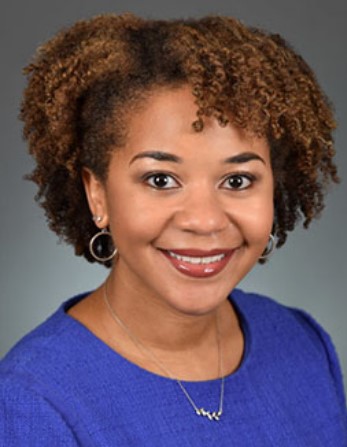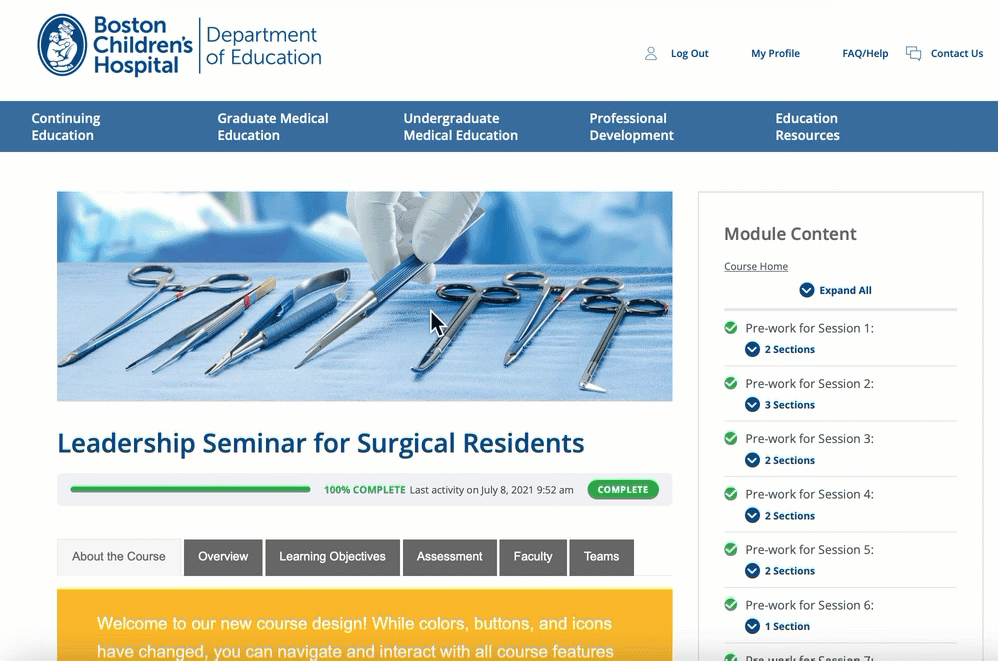
BUILDING BRIDGES OF UNDERSTANDING Part II: Updates
Current Status
Price
Get Started
Course Credit
The following credits are available for this course:
| AMA PRA Category 1 Credits™ (MD, DO, NP, PA) | 3.0 hours |
| Contact Hours (Nurse) | 3.0 hours |
| American Academy of Physician Assistants (AAPA) Category 1 CME Credits | 3.0 hours |
| General Attendance | 3.0 hours |
Click on the Login To Enroll button above to log in and access the conference content. Your login information can be found in the “Access Information” email.
DESCRIPTION (See the References tab for research citations.) This “Updates” course supplements the core course, Building Bridges of Understanding: Behavioral Health Education for Pediatric Primary Care. In addition to providing updated information, Drs. Walter and DeMaso provide answers to questions they frequently receive from pediatricians in their live course, and illustrate those answers with case vignettes. Building Bridges of Understanding: Behavioral Health Education for Pediatric Primary Care is a prerequisite for this Updates course. Learning Objectives: At the conclusion of this course, participants will be able to: COURSE FORMAT (each session approximates 20-25 minutes in duration) COURSE BACKGROUND (See the References tab for research citations.) Psychiatric disorders are estimated to occur in 15 million children and adolescents in the United States, with annual total costs approximating $12 billion.6 Despite effective treatments, because of the protracted shortage of child-trained behavioral health specialists,7 many youth with psychiatric disorders receive no or untimely services.8 Untreated child and adolescent psychiatric disorders persist over decades, become increasingly intractable to treatment, and incur progressively greater social, educational, occupational, and economic consequences over time.9 More than one-half of pediatric primary care visits address behavioral health problems,and PPCPs write the majority of psychotropic medication prescriptions for youth.10 The psychiatric disorders presenting most commonly in pediatric practices are anxiety, depression, and ADHD, at least three-quarters of which are mild to moderate in severity. If PPCPs can become confident and skilled in identifying, assessing, and managing mild to moderate presentations of these disorders, then child and adolescent psychiatrists and other scarce specialty behavioral health resources could be conserved for the management of severe, complex, unsafe, and treatment-unresponsive disorders. In this way, PPCPs can play a key role in narrowing the gap between the millions of youths needing effective BH services and those receiving them. The Behavioral Health Education for Pediatric Primary Care course was developed by the Boston Children’s Hospital Department of Psychiatry and Behavioral Sciences and the Boston Children’s Hospital Pediatric Physicians’ Organization at Children’s (PPOC). The course was initially created as one of the three components (behavioral health education, child psychiatry consultation, integrated practice transformation) of a behavioral health integration program (BHIP) implemented in Massachusetts among the PPOC’s 500 PPCPs. The published findings from BHIP have demonstrated acquisition of target behavioral health knowledge, skills, and confidence by participating PPCPs, increased access to behavioral health services in the pediatric primary care setting, and high acceptability, feasibility, adoption, penetration, and sustainability of the program.11-13 Since the initial implementation in the PPOC, the educational course has been successfully exported to PPCPs in the Children’s Hospital Los Angeles, Connecticut Children’s Hospital, and Collier County, Florida pediatric practice networks. Suggested Audience: COURSE DIRECTOR Heather J. Walter, MD, MPH Senior Attending Psychiatrist, Boston Children’s Hospital Professor of Psychiatry, Harvard Medical School COURSE FACULTY David R. DeMaso, MD Psychiatrist-in-Chief Emeritus, Boston Children’s Hospital George P. Gardner – Olga E. Monks Professor of Child Psychiatry and Professor of Pediatrics, Harvard Medical School Erica Lee, PhD Attending Psychologist, Boston Children’s Hospital Assistant Professor of Psychology in Psychiatry, Harvard Medical School Keneisha Sinclair-McBride, PhD Attending Psychologist, Boston Children’s Hospital Assistant Professor of Psychology in Psychiatry, Harvard Medical School; Funding Graphic Design Video Production Online Course Development RELEASE DATEDescription
Course Format
Course Background
Faculty




Acknowledgements
Release Date
Accreditation
In support of improving patient care, Boston Children’s Hospital is jointly accredited by the Accreditation Council for Continuing Medical Education (ACCME), the Accreditation Council for Pharmacy Education (ACPE), and the American Nurses Credentialing Center (ANCC) to provide continuing education for the healthcare team
.
Physician
Boston Children’s Hospital designates this live activity for a maximum of 5.00 AMA PRA Category 1 Credits ™. Physicians should claim only credit commensurate with the extent of their participation in this activity.
Nurse
Boston Children’s Hospital designates this activity for 5.00 contact hours for nurses. Nurses should only claim credit commensurate with the extent of their participation in the activity.
Physician Assistant
Boston Children’s Hospital has been authorized by the American Academy of PAs (AAPA) to award AAPA Category 1 CME credits for activities planned in accordance with AAPA CME Criteria. This activity is designated for 5.00 AAPA Category 1 CME credits. PAs should only claim credit commensurate with the extent of their participation.
Disclosure Policy
Boston Children’s Hospital adheres to all ACCME Essential Areas, Standards, and Policies. It is Boston Children’s policy that those who have influenced the content of a CME activity (e.g., planners, faculty, authors, reviewers, and others) disclose all relevant financial relationships with commercial entities so that Boston Children’s may identify and resolve any conflicts of interest prior to the activity. These disclosures will be provided in the activity materials, along with disclosure of any commercial support received for the activity. Additionally, faculty members have been instructed to disclose any limitations of data and unlabeled or investigational uses of products during their presentations.
The following planners, speakers, and content reviewers, on behalf of themselves and their spouse or partner, have reported no relevant financial relationships with any entity producing, marketing, reselling, or distributing health care goods or services consumed by, or used on patients.
| Heather J. Walter, MD, MPH | Erica Lee, PhD |
| David R. DeMaso, MD | Keneisha Sinclair-McBride, PhD |
CME Reviewer
Lesley Niccolini No Relevant Financial Relationships to Disclose
Greg Durkin (Nursing) No Relevant Financial Relationships to Disclose or as appropriate
Crystal Tom (Pharmacy) No Relevant Financial Relationships to Disclose or as appropriate
Pamela Charmarro (Social Work) No Relevant Financial Relationships to Disclose or as appropriate
Eugene D’Angelo (Psychology) No Relevant Financial Relationships to Disclose or as appropriate
References
Course Background:
- Foy JM, Green CM, Earls MF, et al. American Academy of Pediatrics Policy Statement. Mental health competencies for pediatric practice. Pediatrics. 2019;144(5):e20192757.
- Walter HJ, Bukstein OG, Abright AR, et al. Clinical practice guideline for the assessment and treatment of children and adolescents with anxiety disorders. J Am Acad Child Adolesc Psychiatry. 2020;59(10):1107-1124.
- Walter HJ, Abright AR, Bukstein OG, et al. Clinical practice guideline for the assessment and treatment of children and adolescents with major and persistent depressive disorders. J Am Acad Child Adolesc Psychiatry. In press.
- American Academy of Child and Adolescent Psychiatry (AACAP) Committee on Collaborative and Integrated Care and AACAP Committee on Quality Issues. Clinical Update: Collaborative mental health care for children and adolescents in pediatric primary care. J Am Acad Child Adolesc Psychiatry. 2023;62(2):91-119.
- American Academy of Pediatrics. Clinical practice guideline for the diagnosis, evaluation, and treatment of attention-deficit/hyperactivity disorder in children and adolescents. Pediatrics. 2019;144(4):20192528.
- Perou R, Bitsko RH, Blumberg SJ, et al. Mental health surveillance among children – United States, 2005-2011. MMWR Suppl. 2013;62(2):1-35.
- American Academy of Child and Adolescent Psychiatry. Severe shortage of child and adolescent psychiatrists illustrated in AACAP workforce maps, 2022. Available at: https://www.aacap.org/AACAP/zLatest_News/Severe_Shortage_Child_Adolescent_Psychiatrists_Illustrated_AACAP_Workforce_Maps.aspx.
- Wang PS, Berglund PA, Olfson M, et al. Delays in initial treatment contact after first onset of a mental disorder. Health Serv Res. 2004;39(2):393-415.
- Copeland WE, et al. Adult functional outcomes of common childhood psychiatric problems: a prospective, longitudinal study. JAMA Psychiatry. 2015;72(9):892-899.
- Olfson M, Blanco C, Wang S, et al. National trends in the mental health care of children, adolescents, and adults by office-based physicians. JAMA Psychiatry. 2014;71:81-90.
- Walter HJ, Kackloudis G, Trudell EK, et al. Enhancing pediatricians’ behavioral health competencies through child psychiatry consultation and education. Clin Pediatr. 2018;57(8):958-969.
- Walter HJ, Vernacchio L, Trudell EK, et al. Five-year outcomes of behavioral health integration in pediatric primary care. Pediatrics. 2019;144(1):e20183243.
- Walter HJ, Vernacchio L, Correa ET, et al. Five-phase replication of behavioral health integration in pediatric primary care. Pediatrics. 2021;148(2):e2020001073.
Please see the FAQs below for common questions about how to work through a course. If you have a question or issue that is not addressed in the FAQ, please use this form to submit a help request, or if your issue urgent, call the CE office at: 617-919-9908.
How do I navigate this course? There are two ways to access and navigate course content with the interactive table of contents: at the bottom of the main course page or in the sidebar on the right side of the page. Select the links in the table of contents to access the corresponding content. Depending on the course, access to content may be linear, in which case each content module or section can only be accessed if the prior ones are completed, or non-linear, in which case modules and sections can be accessed in any order. Use the breadcrumbs at the top of any course page to orient yourself within a course, or return to a previous course section or the main course page. How do I claim credit? If the course has been accredited, available credits will be displayed on the course home page. Select only those credits that apply to your profession, and click/tap “Apply Selection.” You may make your selection at any point while you are taking the course, or after you have completed it. How do I download a certificate? There are two ways to view/download your certificate: from within the course or from the course listing under your profile (select the document icon). In either case, you must have selected at least one available course credit type to generate a certificate. How do I view/print my transcript? You must be logged in to view your transcript. Select My Profile at the top of the page. If you do not see the transcript selector, be sure the Courses tab is selected. Select the type of credit and dates to include in your credit report. To include all credits from all time, leave the options blank. Select Download Transcript to view/download your transcript. Note each credit type in your transcripts starts a new page. How do I request a refund? Please email the CE Department to request a refund.How do I Navigate this Course?

How do I claim credit for this course?
How do I download a certificate?
How do I view/print my transcript?
How do I request a refund?
